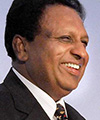Leader Article in The Times of India on The Nuclear Watchdog
It is India's good fortune to play host to Mohamed ElBaradei, Director General of the International Atomic Energy Agency (IAEA). By now, his profile, which resembles Mahatma Gandhi's with his bald head, spectacles and large ears, has become familiar around the world. His nomination for the Nobel peace prize 2004 was on account of the efforts he made to avoid, or at least delay, the Iraq war by repeatedly stating to the UN Security Council that he had not yet found any evidence of nuclear weapons or related activity in Iraq. But the Nobel committee felt Wangari Maathai's million trees did more for mankind than ElBaradei's unsuccessful bid to prevent war.
The Iraq episode is not the only feather in ElBaradei's cap. He runs one of the most efficient UN specialised agencies both in terms of technical capability and political skills. The IAEA has never been plagued by scandal. It enjoys the support of a wide variety of states, ranging from those without even a nuclear laboratory to nuclear weapon states. The nuclear weapon states rely on it to prevent proliferation of nuclear weapons beyond themselves by building a robust inspection system, based on the Non-proliferation Treaty (NPT) and the Safeguards Agreements, backed further by threat of political action by the UN Security Council.
The IAEA is the only UN body to which the US continues to contribute 25 per cent of its budget. India, Pakistan and Israel are active in the IAEA to safeguard their special status. Those who have large nuclear programmes work with the IAEA to satisfy the international community that their activities are within the parameters established by their treaty obligations. The vast majority of the member states, who have no nuclear programmes, depend on the agency's technical cooperation programme to secure nuclear technology for peace- ful purposes. They obtain technology and equipment in areas like health and eradication of pests in return for their commitment not to develop nuclear weapons. The IAEA is more than a watchdog; it has the responsibility to foster the growth of nuclear technology for peaceful purposes. It has to maintain a balance among its three pillars, namely, technology, safety and verification.
Iraq, the Democratic People's Republic of Korea (DPRK), Iran and Libya posed different challenges to the agency. DPRK was a case of a member of the NPT cheating and then leaving the treaty to acquire nuclear weapons. The US turned to the IAEA to make a determination that the DPRK was not in compliance with the safeguards agreement. The IAEA board had no difficulty in coming to that determination, but the revelation that Pakistan might have assisted the DPRK in its nuclear programme added a dimension, which was important from our perspective. The pro-Pakistan elements in the board tried to gloss over the issue when we raised the matter, but we succeeded in including in the chairman's statement on the DPRK a reference to the sources of supply, thus indicting Pakistan.
The Iran saga is yet to be played out, but the IAEA has handled it well. Its first report on Iran in June 2003 indicated clearly that Iran had something to hide, and asked it to explain its failure to act in accordance with its obligations. The board of governors asked Iran and the IAEA to work together to resolve all the issues. The constant endeavour was to keep all issues within the confines of the IAEA. The saga continues as pressure mounts on Iran to give up its uranium enrichment programme, even as France, Germany and the UK try to evolve a package that would meet Iran's needs for energy development without the danger of proliferation of nuclear weapons. The basic position of the IAEA remains that discussions should continue and Iran be given more time to clarify the various issues raised. The November 15-16 meeting of the board would be the next occasion for Iran to avert international action by proving its adherence to its obligations.
The US and UK sprang the Libya surprise on the IAEA, when they said in December 2003 that Libya, a party to the NPT, had been working on developing nuclear weapons for the last 20 years. Libya had a change of heart suddenly and agreed not only to abandon its programme but also surrender the material they had assembled and subject themselves to IAEA inspections. The IAEA was quick to act to ensure that the vestiges of Libya's nuclear adventure were quickly disposed of.
ElBaradei completes his second term and a total of eight years as director general in 2005 and has already indicated that he will be available for another term. There is an opinion that the heads of agencies should have only two terms in future. The Group of 77, which constitutes a majority of the member states in the agency, has already pledged its support to ElBaradei and several other countries are positively inclined. The present situation of the agency demands the continued leadership of ElBaradei regardless of the norms being established for heads of Agencies. India will do well to reiterate its support to him publicly to reinforce the G-77 position.
(The author represented India at IAEA.)
